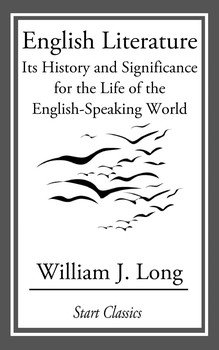Description
Introduction
William J. Long’s name is almost synonymous with the study of English literature for many students and enthusiasts. His influential works, particularly his detailed explorations of English literary history, have shaped the way English literature is studied worldwide. But what is it about his work that continues to resonate with so many, and why is English literature itself such an essential subject? Let’s explore the fascinating contributions of William J. Long to the literary world.
Overview of William J. Long’s Contributions
William J. Long was more than just a literary critic; he was a storyteller who brought history, poetry, prose, and drama to life for his readers. His comprehensive approach to English literature allows readers to connect with the humanity embedded in literary history. Through his insightful analysis, Long emphasized the importance of literature in understanding societal changes, emotions, and intellectual growth.
Importance of English Literature as a Subject
The Role of Literature in Society
Literature, in all its forms, serves as a mirror to society. From Shakespeare’s tragedies to Dickens’ novels, the pages of English literature reveal the struggles, triumphs, and evolving values of generations. By studying English literature, we gain insight into the cultural, political, and emotional frameworks that shaped various historical periods.
Why Study English Literature?
Why should we study literature that was written centuries ago? English literature is not just a record of past lives; it teaches us to think critically, empathize with different perspectives, and appreciate the beauty of language. The words penned by authors like Milton, Chaucer, and the Brontë sisters continue to resonate because they address timeless themes—love, loss, ambition, and the quest for justice—that are as relevant today as ever.
Background of William J. Long
Early Life and Education
William J. Long was born in 1867 and showed an early interest in both nature and literature. He was an ordained minister who also pursued his love of writing, particularly focusing on nature books and literary studies. His education at Harvard University gave him a solid foundation in literary criticism, which he used to great effect in his later works.
Career as a Writer and Literary Critic
Long balanced his life between two passions—nature and literature. His deep connection with the natural world often found its way into his literary works. As a literary critic, he was particularly interested in tracing the development of English literature from its roots to modern times, helping readers understand the broader context of the works they were reading.
Key Themes in English Literature
The Evolution of English Literature
English literature has evolved over centuries, influenced by historical events, societal changes, and literary movements. Let’s take a closer look at its journey.
Old English Literature
This period, spanning roughly from the 5th to the 11th century, is marked by works like Beowulf, which reflect the values and challenges of the Anglo-Saxon world.
Middle English Literature
From the 12th to the 15th century, the Middle Ages saw the rise of writers like Geoffrey Chaucer, whose Canterbury Tales is considered a cornerstone of English poetry.
Modern English Literature
Modern English literature, starting in the 16th century with the Renaissance, brought figures like Shakespeare and Milton to the forefront. This period’s literature is still studied and performed widely today.
Notable Literary Movements
The Renaissance and its Influence
The Renaissance was a period of renewed interest in classical antiquity, which led to a flowering of English poetry, drama, and prose. Shakespeare, Spenser, and Marlowe are among the greatest names from this era.
Romanticism in English Literature
Romanticism, which emerged in the late 18th century, emphasized emotion, nature, and individualism. William Wordsworth and Samuel Taylor Coleridge are key figures from this movement.
Realism and Naturalism
The 19th century saw the rise of realism and naturalism, which sought to depict everyday life with honesty and detail. Authors like Charles Dickens and Thomas Hardy explored the grittier side of society, often highlighting social injustices.
William J. Long’s Approach to English Literature
His Writing Style
Long’s writing style is both academic and accessible. He had the rare ability to present complex literary history in a way that was engaging for both scholars and general readers. His focus was on making literature approachable and relatable.
Key Works and their Impact
One of Long’s most well-known books, “English Literature: Its History and Its Significance”, remains a staple in literary studies. This work provides a chronological overview of English literature, explaining its development and major works with clarity and insight.
Notable Works of English Literature
Works Covered by William J. Long
Long’s analysis of English literature covered a wide range of genres and periods. He placed special emphasis on early works like Anglo-Saxon poetry, which laid the groundwork for later English literature.
The Importance of Anglo-Saxon Poetry
Anglo-Saxon poetry, such as Beowulf, is one of the oldest examples of English literature. Long considered these early works crucial for understanding the later development of English poetic forms.
Critical Reception of William J. Long
Academic Recognition
Long’s work has been widely recognized by academic institutions, and his books have been used in classrooms for decades. His methodical and passionate approach to literary history earned him a place among respected literary scholars.
Criticisms and Controversies
Despite his success, Long was not without his critics. Some scholars felt that his approach lacked the theoretical rigor of other literary critics. However, Long’s focus was always on making literature accessible rather than overly academic.
The Legacy of William J. Long
His Influence on Modern Literary Studies
Long’s work remains relevant today, particularly for students who are new to English literature. His ability to present literature as a living, breathing subject helped generations of students appreciate its richness and relevance.
Impact on Students and Literature Enthusiasts
Through his books and lectures, Long inspired countless readers to delve deeper into the world of English literature. His legacy lives on in the students who continue to explore the works of Chaucer, Shakespeare, and the Romantics, guided by his insightful commentary.
Conclusion
William J. Long’s contribution to English literature is undeniable. His works continue to inspire and educate new generations, offering a window into the vast world of English literary history. English literature, through Long’s lens, is not just a subject to be studied but a living dialogue with the past that shapes our present and future.




Reviews
There are no reviews yet.